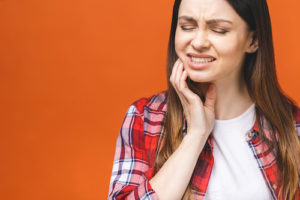The term ‘impacted teeth’ is used to describe those teeth which were unable to properly come out from the gum tissue or align with the rest of the teeth as normal. Sometimes, a tooth may become only partially erupted, meaning a corner or side of the tooth is below the gumline while another is above. In either case, both a cause and result of impacted teeth is overcrowding in which there isn’t enough space for all of the teeth to sit in one’s jawline properly, and thus outside assistance is necessary.
There are several different ways impacted teeth can occur and, likewise, several different treatments for it. Fortunately, Lovett Dental Jersey Village has an experienced team that can help clients get the smile they desire.
Types of Impacted Teeth
The main types of impacted teeth are:
- Mesial Impactions – This is the most common type of tooth impaction, especially regarding impacted wisdom teeth. Here, the tooth partially erupts through the gum line at an angle towards the front of one’s mouth.
- Vertical Impactions – Sometimes, the jaw is not large enough for the teeth and thus, what happens is you’ll get a tooth that is the correct size, in the correct position, and is ready to erupt at the correct angle but is unable to do so because of being blocked by another tooth. Generally, this type of impacted tooth will be monitored. Still, it won’t require impacted teeth. removal unless it causes too much pressure on the neighboring tooth root
- Horizontal Impactions – Not very common, this type of impaction results when a tooth has formed fully horizontal in the gum lines and thus wants to erupt horizontally, pushing against another tooth.
- Distal Impactions – The rarest type of impacted tooth of all, this type of impacted tooth is directly opposite of a mesial impaction. Meaning, with distal impactions, the tooth will erupt at an angle, but that angle will be towards the back of the mouth and may be either partially or fully impacted.
Choosing the Right Treatment
The type of treatment for an impacted tooth will depend on the type of impaction and where the tooth is.
- Exposure and guiding – This type of treatment is generally reserved for non-wisdom teeth, such as impacted canine teeth. Here, the impacted tooth will be surgically exposed, and then the dental surgeon will manually guide the tooth into the correct position.
- Braces post-eruption – If your impacted tooth can erupt fully on its own and does not cause excessive over-crowding, then your orthodontist may recommend braces or a similar post-eruption correction tool. Mesial and horizontal impactions can often be corrected in this manner.
- Tooth removal – Impacted teeth removal is necessary in all cases of horizontal wisdom teeth impactions and may be recommended in vertical and mesial impactions. In rare cases of other teeth (i.e., the canine), the exposure and guiding method may be used depending upon the tooth’s position underneath the gums. Impacted teeth removal requires surgery in which the patient will have to undergo anesthesia.
Schedule an Appointment Today for a Personalized Consultation with Lovett Dental Jersey Village
We know that the idea of surgery can be a bit overwhelming, but if you are experiencing pain, swelling, bleeding, and other uncomfortable symptoms, it is time to get relief. Left untreated, impacted teeth, especially impacted wisdom teeth, can cause intense pain and severely alter your smile’s appearance and potentially lead to infections that can cause other health issues. Contact our team at Lovett Dental Jersey Village today at 281-890-5002, or contact us online to learn more about impacted teeth and to schedule an appointment with one of our orthodontists. The only way to know what treatment is best for you is to have your teeth and gums fully examined and x-rayed.
